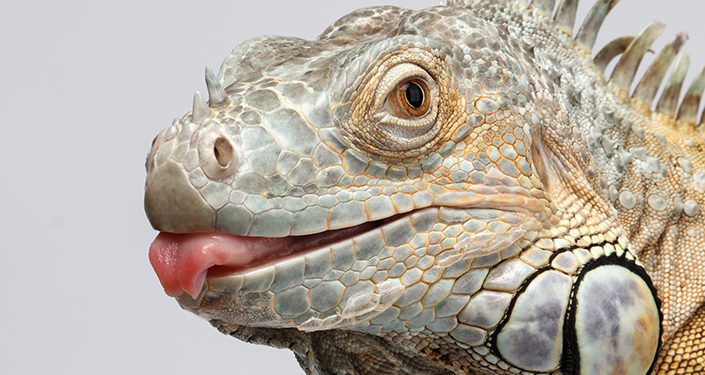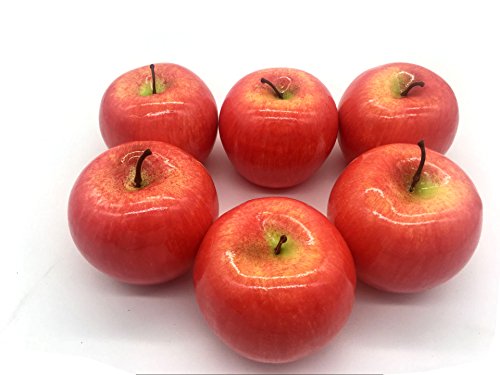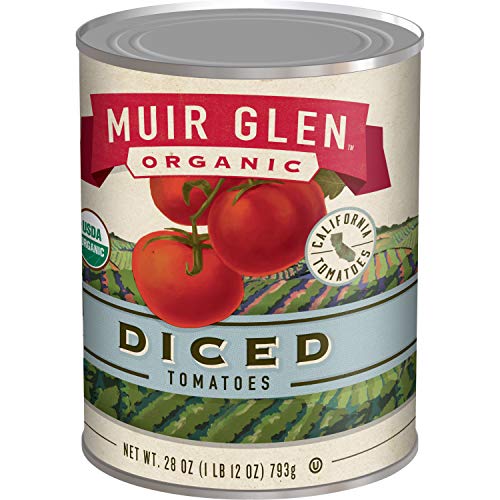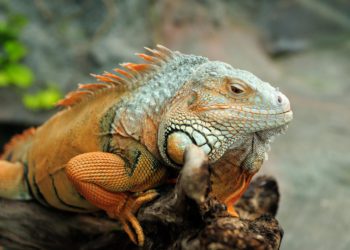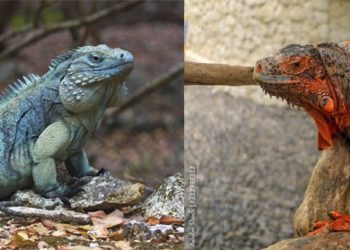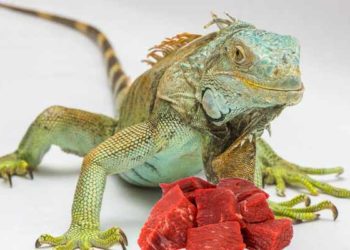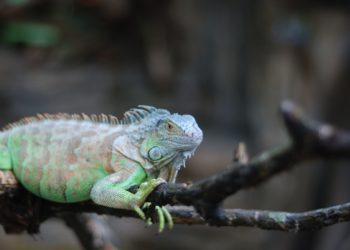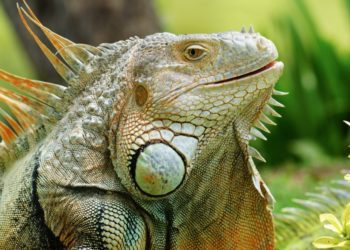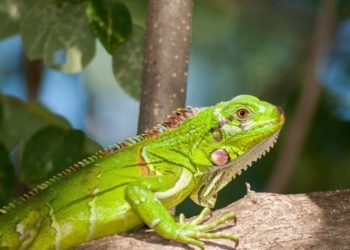Feeding the pet properly with nutrient rich food is necessary and it is a vital responsibility of the pet owner. While keeping pets like iguana is fun and exciting, you need to be aware of right kind of vegetables and greens ideal for this reptile.
Contents
What iguanas eat in wild?
Iguanas prefer to eat vegetables and mostly they prefer to eat leaves, which make them folivores. While in the wild they prefer to eat leaves from vines as well as fruits and flowers. There are special microbes in their system which helps them to digest high fiber foods in their intestines.
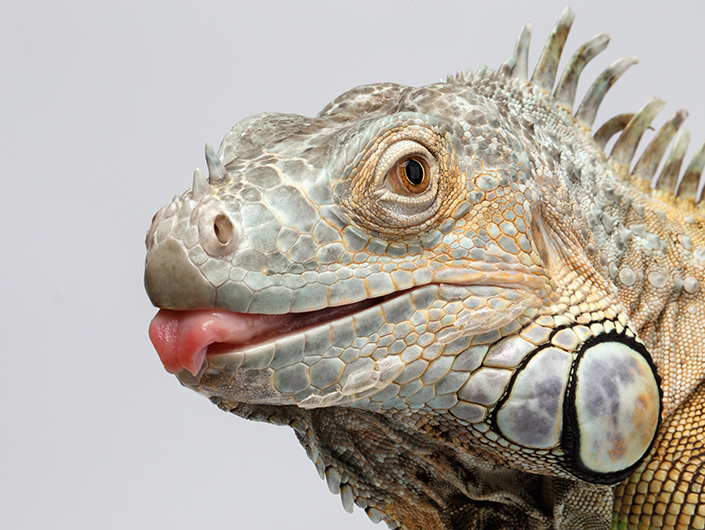
Which plants do iguanas eat?
Among the green vegetables and leaves, iguanas should eat mostly the dark green leaves. That should consist of 80%-90% part of their food. Rest of the food can be consisting of colored vegetables like red, yellow or orange vegetables.
Which greens are not good for iguana?
Do not feed iguanas with the light green vegetables which are low in nutrients and vitamins. Greens like iceberg lettuce or celery do not provide with required food value.
What is good food for iguanas?
Whichever vegetables that have calcium content in them are good for the iguanas. You can feed them with vegetables like Bok Choy, Swiss chard, kale, alphalpha hay, turnip greens, parsley, kohlrabi, escarole, dandelion etc. An adult iguana can consume 40 to 50% of such greens.
Here is the list of best food for iguana.
Also you can feed the iguana with coloured vegetables like carrot, bell peppers, sweet potato, okra, cucumber, asparagus, peas and squash.
Iguanas food list – Can they eat or not?
Here we are listing the mega guide and your queries on what can and cannot be fed to iguana.
Can iguanas eat oranges?
Orange does not come in the list of fruits that can be safely consumed by the iguanas. It is acidic in nature and thus it is not recommended for this reptile pet. There are certain reasons which cause problem when iguanas eat oranges.
The presence of citric acid in orange makes it difficult to be digested by iguanas. Their digestive system does not allow the breaking of such citric food, so it will not be suitable.
Iguanas are the creature of forest and it is not very often that they can get to eat fruits, be it citric or sweet. Even the sweetest fruit contains some amount of acid too. As iguanas are not genetically adapted to consume fruits, they are unable to break down such fruits and extract the nutrients.
Some oranges come with high amount of sugar, which is another ingredient not to be eaten by iguanas. You must not give this fruit to your pet iguana, even if they would love the taste of this fruit.
High content of vitamin C is something that is also not prescribed for the iguanas. This is not a suitable component for the iguana.
This fruit is not available within the reach of iguana when they are in their natural habitat. Being quite territorial, iguanas do not wander outside their territory to search for any particular fruit. So their systems are not much in tune with this vitamin C rich fruit.
However, you can still feed your iguana with a slice or two of orange. But you have to be alert to see how it responds to the fruit. If you find it getting sick after consuming oranges, never should you try to make it eat orange. The digestion power of iguana varies individually so your iguana may be able to digest such fruit.
Even if it can consume orange safely, you should not feed iguana with such fruits regularly. Orange can be used as treat and should be fed once in a month.
Can iguanas eat apples?
The owners of the iguana always try to feed their pet with healthy foods that can keep their pet in best condition. But it is not always possible to know which foods are good for them and which are not. About fruits, there are fewer ones which are helpful for the digestive system of iguana, while rest not suitable for them.
Apples are usually thought to be a healthy and safe option for the diet of us, humans as well as many other creatures. But when it comes to reptiles like iguana, we need to ponder over this topic.
Apples are, good for iguana, when fed in small amount. You can give your iguana one or two pieces of apple in a week, or every alternate day. But it should not be a daily food item.
You must cut the apples in small pieces while serving it to your iguana. Not to be mentioned that the fruit needs to be peeled, as the skin can choke the creature.
Iguanas are unable to chew so when giving them apple or any fruits, it must be cut into very small pieces.
Fruit will be only 20% if the diet of any iguana and among that, apple can consist only 15%. Though this fruit is not unsafe for the iguana, there should not be much of this or any fruit in their daily diet.
The taste of apple is actually cherished by iguanas. But when you give them this sugar high fruit in good quantity, there will be the chance of getting obese for the pet iguana. They do not have much opportunity to exercise within the enclosure or even the boundary of the farm. To avoid such occurrence, you must not feed the pet with too much of apple.
If your iguana consumes too much of apple or any fruit, which is otherwise safe for them, then it will make them sick. They can suffer from diarrhea which is not a good condition for them. The presence of high amount of fiber present in the fruits is not suitable for the digestive system of the iguana.
Removing the seeds of the apple is as important as the peeling of fruits. Do not make the mistake of giving the apple to your pet while the seeds are there. Iguanas do not chew their food, but they swallow it directly. Getting choked with the seeds is not a situation you may want to face.
Even if the iguana somehow digest the seeds of the apple, as those are quite small in size, it can face the issue of poisoning with cyanide, which is an element present in the seeds of apple.
Can iguanas eat avocado?
Keeping iguana as your pet has many benefits, like having a nice and friendly company as well as getting a companion for your daily walks. But taking care of iguana needs special knowledge and expertise. These reptiles are quite docile and usually do not harm the owners. But their food habit is pretty different than other quadruple pets.
Regarding fruits and vegetables, iguanas are pretty choosy. In fact they love to consume fruits and vegetables, but their digestive system is much sensitive. So while offering them fruits and vegetables you need to be cautious and informed.
Avocado is a simple and much available fruit, which is pretty nutritious. But it can be rather toxic for iguanas. You should not feed them with this fruit more often.
Occasional feeding with avocado is okay, as iguanas sometime eat avocados when they are in wild. This is not the best fruit suggested for iguana though.
In terms of food value, avocado is not something to be neglected. You can get Vitamin C, E, K and B-6 from this fruit. But it also contains folate which is toxic for the iguana. They should not consume some item which consist this mineral compound, as it will prevent the nutrient absorption process in their body.
Along with folate, there is niacin and pantothenic acid along with magnesium and potassium. These minerals are not needed for the growth of iguana, and thus avocado cannot be of much help when it comes to nutritional value of this fruit when consumed by this reptile.
Avocado is one of the FODMAP food, which contains healthy fat in it. This is a good source of energy but when the iguana is in captivity, the energy will not be needed. This extra energy will be stored in form of fat, which will make the iguana lethargic and obese.
If you insist of giving your iguana a treat in form of avocado, you can do that. But do not give a whole avocado to the pet in a single day. You can give it in small pieces and that too should be restricted to once in a month or two.
Can iguanas eat carrots?
Carrots are in the list of good vegetables that can be fed to iguana. You can expect the pet to enjoy its diet when you provide some small pieces of this saffron colored vegetable. Carrots are healthy item which provides them with vitamin A and many other nutrients.
Carrots are high in fiber which is not great for iguana, but other ingredients present in this food like beta carotene makes it good for the systems of iguana.
There are antioxidants which is always helpful for the any creature including human. But the presence of potassium can make the vegetable not suitable for the iguana when eaten daily or in large portions.
You must maintain the variety in the diet of the iguana, as that will help the reptile to get balanced amount of all the nutrients. Do not feed it with a whole carrot at a time or in a single day.
Carrot should be cut into small pieces as unless, it will not be able to swallow or digest it. So you can give the vegetable to the pet, when you cut it properly.
However, if you adopted a baby iguana, you should never give it carrots until it gets mature. Carrots are source of high amount of fibers which is not appropriate for the baby iguana. You can give it carrots in one or two pieces, while mixed with baby feed. This time the carrots should be softened by boiling them little bit.
Carrots have the ability to lower the cholesterol so it is helpful for the iguanas. There will be less chance of getting fat when they will digest carrot.
Eye health is improved by the consumption of carrot, which is another beneficial factor of this vegetable.
You need to offer carrots occasionally to iguanas. This is a good food item but regular intake of this vegetable can cause problem for the reptile pet.
Carrots contain high amount of oxalate which does not help iguanas. It will in fact prevent the calcium absorption which is not great for iguana. This reptile is much dependent upon calcium for their bone structure.
Can iguanas eat pineapple?
Iguanas prefer to eat vegetables when they are young, though they learn to eat some protein based food when they grow up. They love to eat almost any kind of fruit and vegetables, especially if you offer them sweet fruits they will love it.
While you will try to feed your iguana with tasty and helpful fruits, you must know that some of them are not so good, and can even be toxic for them.
Juicy and nutritious fruit like pineapple can be fed to your iguana, but there are pros and cons to it.
High content of vitamin C makes pineapple a good choice for the herbivorous creatures. Also there are loads of minerals like calcium, phosphorus and manganese.
You will also be amazed to know that it packs a high dose of other vitamins like vitamin A and K. But feeding your iguana with a good amount of pineapple is not advised, though the taste and smell will be loved by your reptile pet.
The presence of calcium, manganese, vitamin C, fiber and water helps the iguana. Calcium is always a good mineral for the iguana as that helps in bone structuring. The bone formation is a lifelong process and pineapple, which has good amount of calcium, keeps the bone structure hardy for the days to come.
Protein percentage is low in pineapple, which is a beneficial factor for the iguanas. Foods rich in protein are not much helpful for the herbivorous animals. Good amount of protein in their diet can trouble their liver and kidney, where the excess protein will be absorbed.
Fruits can never be staple food for iguana as they should eat 80% of green leafy vegetable along with some pieces of fruit. So if you plan to feed the iguana with some small pieces of pineapple, you should do that occasionally.
Oxalic acid present in the pineapple is not helpful for the iguanas, as that will prevent the consumption of calcium for the iguana. They will not be able to utilize the calcium present in pineapple in adequate amount.
Oxalate also causes binding of calcium, which is not released with the urine. This way the calcium will not be released or used in the body, but will cause kidney stone.
The amount of calcium available in pineapple is pretty low, as 100 g of pineapple will offer 13 mg of calcium, whereas the same portion of pineapple also comes with 9.8 g of sugar. This is not advised to feed the iguana with 100 gm of pineapple which will ingest high amount of sugar.
You can give your iguana two or three small pieces of pineapple in a week, and not more than that.
Can iguanas eat watermelon?
Watermelon is a juicy and red colored fruit which is consumed lovingly by us and many pets as well. This fruit has high amount of water along with vitamin A, C and B6. This fruit is also rich in antioxidants, amino acids and lycopene.
Iguana is a creature of wild and they do like to eat various kinds of fruits with green vegetables. You can offer them watermelon but before that you should know how good it is for them.
As we have already stated that watermelon consists of 92 percent of water, this is a good source of hydration for iguana. With each slice of watermelon, the reptile can have ample water content.
Vitamin A, C and B6 are great for the health of iguana as these vitamins will give them a boost of immunity. Vitamin A is also good for bone strength and Vitamin C will help them to stay healthy.
This fruit is rich source of antioxidants but this is not a much helpful ingredient for iguana. But the fruit is not much acidic which is great for this pet animal. You can give them watermelon in small portion as they should not eat more than 10% of fruit in their diet.
There are no harmful side effects of watermelon, except that it is a sweet fruit, and sugar is not good for the health of the iguana. You can offer the pet slices of watermelon, along with some dark green vegetables.
Regular feeding with watermelon is not suggested for obvious reasons. That will cause too much sugar consumption for this pet. You may not want your pet to get obese as they do not get much chance to be active within the enclosure.
Removing seeds is a must as they cannot check the seeds while eating this or any other fruit. You should never give them watermelon with seeds, nor should the piece of watermelon be big. Bigger piece cannot be managed by the iguana and thus it will choke them easily.
Can iguanas eat blackberries?
Blackberry can be a good source of natural sugar to us human, but this fruit also packs good amount of energy, little bit of fat and some amount of carbohydrate. Other than energy, the fat and carbohydrate part is not good for iguanas.
Vitamin C contained by blackberries is rather a helpful ingredient. There are multiple benefit of vitamin C. it helps in collagen formation in bones as well as tissues and blood vessels. This vitamin also helps in healing the wounds, so when the iguana gets scratches on its body, vitamin C will mend the cut soon.
Skin regeneration is another kind of benefit offered by black berry. This fruit helps the iguana in time of shedding. Also it will help to ease out all the skin related problems.
Iron absorption is another benefit offered by blackberry. It will help the iguana to get the iron extracted from their regular diet.
There is high fiber content in blackberry. This is beneficial for managing the cholesterol as well as easing the bowel. Iguanas tend to constipate often, so if you feed them occasionally with blackberry, you will get to see regular bowel in them.
Healthy bacteria is nourished by this fruit, so you can feed your iguana with little dose of blackberry which will keep the iguana healthy from inside.
Vitamin K present in the blackberry makes the iguana safe from the cuts, as vitamin K helps in blood clotting. It will not bleed profusely as the oozing blood will clot soon thus saving the pet from over bleeding.
Collagen formation is initiated by manganese present in blackberry. Thus your iguana will be saved from osteoporosis or such bone related ailments if you feed blackberry once in a while. However, too much manganese can cause anemia or other liver related disease, so stay away from feeding blackberry regularly.
Can iguanas eat basil?
Basil is one of the safest herbs for all beings. It can be eaten raw thus it does not contain any toxic element in it. However, taking raw basil for a long time is not helpful as it may increase the level of estragole, which is a possible cause of cancer.
This is an aromatic herb which can sometimes be used on the dishes of salad for iguana. You can add this as dressing, which will also increase the flavor of the vegetables that are served in their dish. A moderate amount of basil in the salad dish is okay for the reptile.
Your pet iguana may or may not like the smell or flavor of this herb, so while offering them basil, you must check their reaction. If you find that the iguana is refusing to eat the dish when you have served it with basil dressing, then it is best to be avoided.
Basil is not advised to be fed in regular terms or in heavy amount as there are certain chemical in basil which slows down the clotting of blood. So if your iguana intakes too much basil then it will not be safe for them.
Lowering blood pressure is another effect of basil intake. While it causes low blood pressure in human when taken in regular amount, it should be served in checked quantity to your pet iguana to prevent any kind of disease.
For bacterial and fungal infection basil works wonderfully. So when you see your iguana getting affected by various kinds of fungus you can offer some basil leaves in its meal. It may treat the irritation of skin well.
Treating the internal injury is also possible through the help of basil. If your iguana got cut inside its mouth or any other internal part, or it is facing some problem due to cold and cough, basil will be much helpful.
Treating stomach problems is another benefit offered by basil. You can offer two or three basil leaves chopped with other vegetables in their meal. It will help the iguana to prevent cold related problems.
Can iguanas eat peanuts?
When we are discussing the food and diet of iguana, we must not forget that while keeping pets, we often offer them food that is actually in our diet. These pet animals also get used to with foods that are not originally meant for them
Peanut butter is a tasty food which is gobbled by kids and adults, but when given to iguana, they have seen to quite love the taste. It contains some good ingredients which are helpful to iguana as well.
There are a whole lot of antioxidants in peanut butter which is great for humans, but not much effective to the system of iguana. However, this is not all, as peanut butter also contains potassium which is helpful to build muscles. This is an element which, combined with protein, helps in fitness.
There is ample amount of magnesium which is a bone building materials. So if you think peanut butter does not help your iguana to grow, think twice. It is much helpful in terms of building the bones and iguana will live longer without any bone disease.
However, not too much protein or muscle building element is required for the iguana, as they are not very active in their captive stage. So consuming too much protein based food will not be beneficial for them.
There is a unique benefit of peanut butter, which is after consumption it takes longer to get digested. Thus it makes the iguana feel full for a longer time. You can give it in small portion to keep it energetic, especially when it is not feeling well due to energy lack.
This is good for keeping the heart of iguana, as it contains mono-saturated fat. This is a good fat which does not let the cholesterol block the arteries and thus good blood circulation is also a benefit of this food.
Peanut butter is a commercially prepared food which is not to be taken by the iguana in heavy amount. You must not feed the iguana with the peanut butter as it is sweet and can cause acidity in your pet.
However, as this is a tasty item, you can give one spoon or half a spoon of peanut butter, once in a while. You can make it practice doing some trick while alluring it with this kind of tasty treat. But feeding with too much peanut butter or repeating the treat may not help the iguana to stay healthy.
Can iguanas eat broccoli?
Broccoli is a vegetable which is healthy for human as well as iguana, so when you have a share of this green vegetable, share a portion of it with your pet too. As a reptile, iguana can digest up to 40 to 50% of vegetables. You can give them some vegetables in moderate portions which does not cause any harm to them. Broccoli is one such vegetable that can be safely fed to iguana.
Digestion of broccoli is easy as it offers high amount of fiber. While feeding this green vegetable you can be sure of your iguana getting clear bowels. Also you can feed this vegetable once you see your iguana is getting fatty or overweight.
This vegetable is much low in calorie which makes it a great item for the iguana. You can give them in small portions almost 3 days a week, without fearing of getting obese or acidity.
This vegetable contains multiple vitamins. There is vitamin A, K, C and E, which are all very useful for the overall health of iguana.
Broccoli is also rich in calcium which, along with vitamin K, helps in bone construction. Bone decay is prevented by this mineral and it also combats osteoporosis. Other than these, zinc and phosphorus impacts bone health.
Sulforaphane is a chemical that is present in broccoli and it works to prevent the enzyme which causes joint pain. Thus your iguana will be benefitted from this vegetable greatly.
Your iguana can get rid of any allergic reaction if you feed it with broccoli. Omega-3 fatty acid present in broccoli helps to reduce any kind of inflammation.
Too much broccoli, like any other ingredient, is not good for iguana, as it will tamper the thyroid hormone production. It can cause hormonal imbalance in their body.
Can iguanas eat celery leaves?
Celery leaves are not very healthy diet option for iguanas. These light green colored vegetable often comes with lots of fiber but lacks in nutritional value. Thus you can feed your iguana with celery but in lesser amount.
Celery leaves as well as celery stalks are not much helpful for the iguana. You can occasionally give them this vegetable but this should not be a part of their staple meal.
This light colored leafy vegetable offers medium amount of vitamins and minerals. Along with vitamin A, K, C it also contains low glycemic index.
Moderate amount of potassium is there which can help the iguana to get good health. But the presence of folate is preventive of calcium absorption. This is another reason which acts against consumption of celery.
There are minerals like magnesium, sodium and iron which are good for neutralizing acidic condition in iguanas’ body. Also these minerals work positively for overall body functioning.
If you wish to feed the iguana with celery, that should be nominal and occasional. Chopping the leaves is best option to feed them, and always go for fresh crunchy leaves. Omit the stalks and only offer the leafy part of this vegetable to your iguana.
Can iguanas eat grass?
Iguanas are used to with eating grass as this green is abundantly available in the wild where they originally live. The regular species of grass does not contain much nutritional value, but at the same time it does not pose any threat to this reptile.
If your pet iguana is seen eating grass when left on the farm to roam, do not panic. This will not harm this reptile, only you have to make sure that they are not ingesting grass with hard roots or the soil attached to it. The soil and hard roots can cause them choking, or if they somehow swallow it, it can cause digestion problem.
There are certain variations of grasses. Some of them are actually nutritious for the iguana, like chicory, alfalfa and horse tail. But you have to be sure that your pet is not having the hard or rough parts of the grasses at any point.
Do not let it roam on its own. Always keep a check on your pet iguana to see if it is eating something undesirable. Some grasses with flowers can be toxic to them. It is better to feed them before letting them in the open, so they do not try to eat something outside.
If you use some pesticide or chemical fertilizer on your lawn, then make sure not to let the iguana roam there at least for a week. As we all know that these are toxic chemicals and your iguana may fall sick after eating anything from the lawn.
Can iguanas eat kiwi?
Fruits are often loved by the reptile pet, iguana. Each fruit is packed with its own kind of flavor, test and color. Kiwi is a small fruit which is full of various nutrients. This fruit comes with green flesh inside and black tiny seeds.
This vitamin enriched fruit comes packed with vitamin K, C and E. along with that it contains folate, fiber and antioxidants. Now all these are not helpful for the iguana, but surely vitamins are beneficial for them.
Folate, as we all know, prevents the calcium absorption. You must not make eating kiwi a regular habit as it will damage the bone structure of this reptile. Iguana needs constant flow of calcium to stay fit and hardy.
You can peel it before serving it to iguana but the seeds are edible and quite small. So it will not choke this reptile even if they do not chew it before swallowing.
This fruit helps in digestion so you can feed this to your iguana without fearing acidity. Proteolytic enzyme present in this fruit breaks down the protein in the body and thus it makes the digestion of other consumed food easy.
Immunity system is boosted by having some amount of kiwi weekly. Vitamin C present in this fruit makes the iguana healthy and also safe from various diseases.
This fruit reduces the fat level of blood and thus the blood will take longer to get clotted. However, this way it does not become much beneficial for iguana.
Can iguanas eat tomatoes?
Tomato is a soft fruit which makes it an ideal food item for iguana, who does not chew its food before swallowing. This vegetable cum fruit comes with a pungent flavor, which, according to many iguana parents, is quite liked by this reptile.
This fruit is quite rich in nutrients. There are whole lots of vitamins like C and K along with minerals like folate and potassium. There are red, green and yellow varieties of tomato available, but most of them contain similar amount of nutrients.
This fruit contains high amount of water, which is great for iguana. They get ample hydration when eat one tomato at a time. Very low amount of carbohydrate and sugar makes it an ideal option for this reptile too, as both carbs and sugar are not good for their health.
There is little amount of fiber present in this fruit, which is also great for the iguana. They will get good amount of nutrients but fiber amount will be least in this fruit.
The small amount of fiber present in this fruit is also insoluble, which makes it good for bowels. The only downside of tomato is folate, which is good for tissue building in human, but not so helpful for iguana.
If you wish to offer tomato to your pet iguana, you can give it in small pieces. Though a mature iguana can digest one whole tomato at a time, giving it into small pieces and moderate amount is the safe choice.
Can iguanas eat zucchini?
Feeding the pet iguana with zucchini is a common practice among their owners. This is an easily available fruit with some ignorable seeds, so feeding this is an easy option. Fruits are not a part of main diet for iguana as it contains only 20% of the diet list of this reptile.
This fruit with a soft rind is quite manageable for iguanas, if they are cut into small pieces. This one consists of limited amount of calorie which makes it a great choice for iguana diet. But it does not lack in nutrients.
Vitamin B6 is one of the prior ingredients of this fruit, so it regulates blood glucose easily. You can feed it to your iguana as it will not cause any toxicity but will keep the blood sugar level moderate.
A good amount of vitamin A and potassium makes zucchini a great staple for the iguana. But you should make sure that your iguana is not allergic to this fruit. Offering it very little amount of this fruit will help you to understand its health condition at the first time. Later you can give zucchini to your iguana in moderate amount twice of thrice a week.
Zucchini is also good for eyesight. It will improve the eye health of your iguana and it will lessen the cause of cataract even if the iguana gets old.
If you have any other pet such as bearded dragon you can have the food guide here.


